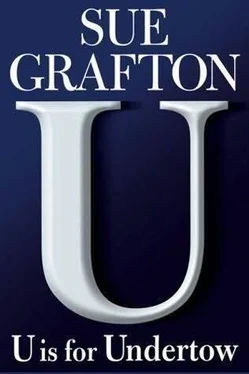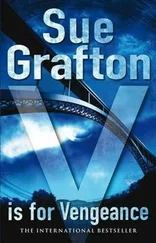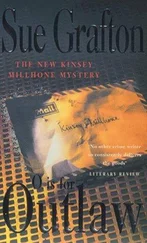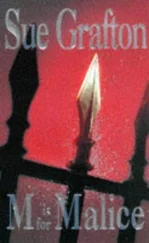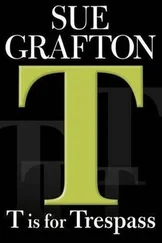I stepped on the ember and then found the roll of paper toweling. I tore off a sheet, wet it, and made quick work of the ash, which I tossed in the wastebasket.
While she struggled to uncork the wine, I said, “Mind if I look around?”
“Have at it.”
I circled the kitchen, glancing into the three adjoining rooms-a glassed-in back porch that ran the width of the house, formal dining room, and den. By the time I finished my minitour, she’d taken out an enormous wineglass and poured me enough Chardonnay to float a small school of fish.
“We can sit on the porch unless you have a better idea.”
“I’m with you,” I said.
I tagged after her as she crossed the kitchen in a billow of silk. Windows, mounted above wainscoting, now enclosed what had probably once been a bare concrete patio. A sisal carpet covered much of the floor, and the windows could be protected with roll-up blinds if the sun hit at a blinding angle at odd times of the day. The furniture was white wicker, old-fashioned compared to the rest of the house. Looking out, I realized the house to the right of hers was where the Unruhs had lived. I couldn’t see the spot where the techs had gone to work, but it felt odd to know I was in range of a site that had occupied so much of my imagination of late.
She settled on one of two love seats that faced each other across a wicker coffee table. She leaned forward and snagged an ashtray, pulling it closer so she could light another cigarette. The ashtray was metal and the spent paper match made a tinking sound when she tossed it in. She took a deep drag on her cigarette and blew out a stream of smoke, lifting her head slightly to avoid blowing it in my face. “Now then. Why did Felix send you over here? Natural charm aside, I’m sure you have a deeper purpose in mind.”
“I’m interested in talking to Deborah Unruh. Felix thought you might put me in touch.”
“Really. And what’s your interest?”
“I’m a PI.”
“Excuse me?”
“I’m a private investigator. My client was the one who motivated the cops to dig up the Unruhs’ backyard.”
“How did your ‘client’ talk them into it? That must have been a trick.”
“He remembered something that happened when he was six years old and thought it was connected to a crime.”
“And what crime was that?”
“I’d prefer not to say.”
“I see. So you want information from me, but you won’t pony up yourself.”
“Good point. I’m talking about the Mary Claire Fitzhugh kidnapping.”
“What’s that have to do with Deborah? They dug up a damn dog. I don’t see the relevance.”
“The dog was buried in 1967 when she and Patrick were still living in the house.”
“I’d say ‘So what,’ but I don’t want to sound rude.”
“It was right around the time Mary Claire Fitzhugh disappeared.”
She studied me briefly. “You’re not drinking your wine.”
“It’s a little early in the day for me.”
“I usually start at noon, so this is late as far as I’m concerned. You really ought to loosen up. One little taste won’t kill you.”
I took a sip of wine, which I confess was head and shoulders above the crap I’m used to drinking. “Wow. That’s really lovely.”
“Told you so.” She was silent for a moment, pressing a wrinkle out of the silk in her lap. “Funny you should mention Mary Claire.”
“How so?”
She studied the end of her cigarette. “Don’t think I’m telling tales out of school here, but Deborah had a similar experience. Her grand-daughter, Rain, was abducted maybe ten days before Mary Claire was kidnapped. Happily, Rain was returned unharmed, but Deborah believed Rain was what she called the ‘practice child.’ Rehearsal in preparation for the real deal.”
JON CORSO
Summer 1967
The Amazing Mona had arranged an eight-week trip to France and Italy, departing after the school year ended in June. She and the girls had been to Europe when she was married to her former husband, and now she wanted to relive the joys of foreign travel with Lionel in tow. Lionel saw the trip as an opportunity to do research for a book on the lesser-known American expatriates writing in Paris after World War I. In May of Jon’s senior year at Santa Teresa High, his academic performance was still so poor that it was clear he wasn’t going to graduate. As a consequence, he was excluded from the family vacation.
He was three credits short of what was required for his diploma and he’d managed to exasperate just about everyone, including his English teacher, Mr. Snow, who snagged him one afternoon after class. Mr. Snow was thirty-five years old, dedicated and energetic, new to Santa Teresa High School, where he taught English and creative writing. He’d had two novels published and he was working on his third. He perched on the edge of his desk, with his grade book open in front of him. He ran his finger down the column of Jon’s classroom grades, many of which read “incomplete.” He shook his head while Jon sat in the front row, posing as a kid busy contemplating his sins.
Mr. Snow said, “I don’t know what to do with you, Jon. This class is an elective. This is all you needed to graduate and you blew it. You’re a bright kid and you write well-when and if you get around to do it. You might even have some talent lurking in that thick skull of yours. If you’d done even half the assignments, you’d have passed with no problem. Why are you doing this?”
Jon shrugged. “The topics are boring. I can’t relate.”
“You can’t relate. Are you kidding me?”
“What do you want me to say?”
“Where’s this horseshit coming from? That’s what I don’t get. You did well at Climp, until your junior year. I know because I called the school and checked. Now your GPA is in the toilet. I don’t think you’ve lost any IQ points, so what gives?”
Jon shrugged. He kept his eyes pinned on Mr. Snow’s but his expression was blank.
Mr. Snow stared at him. “Are you having problems at home?”
“Not really.”
“You want to talk about it?”
“There’s nothing to talk about.”
Mr. Snow closed his eyes for a beat and tried another tack. “You have plans for college?”
“ City College maybe. I haven’t decided yet.”
“Well, you better pull your thumb out. If you don’t get into some college, you risk being called up.”
“I thought they were mostly taking older guys.”
“You want to take that chance? The last two years, they’ve bumped up the draft to thirty-five thousand a month. That’s a lot of young men.”
“Yes, sir. I’m aware of that,” he said, polite but unyielding.
Mr. Snow set the grade book aside. “Do you like to write? I’m asking because when you bother to do it, you’re not half bad.”
“Writing’s okay. I like it pretty well. I mean, not all the time, but sometimes.”
Mr. Snow studied him. “Here’s what I’m willing to do. I’ll set you up in an independent-studies program, just the two of us. You turn in the work and you’ll pass. I guarantee it. Mr. Albertson might even let you go through the graduation ceremony. He can leave your diploma blank and we’ll take care of it at the end of summer school, assuming you haven’t dropped the ball.”
“What would I have to do?”
“Well, Jon, this is a writing class. You’d have to write, as wacky as that might seem. If you’re bored with my topics, you can tackle your own.”
“Like what?”
“That’s up to you. You can’t have it both ways. You either do the pieces I assign or you come up with your own. At the end of each week, you turn in everything you’ve done, and I mean everything-false starts, cross-outs, bad paragraphs, ideas that bomb. The first time you fail to deliver, you’re out. Do we have a deal?”
Читать дальше
